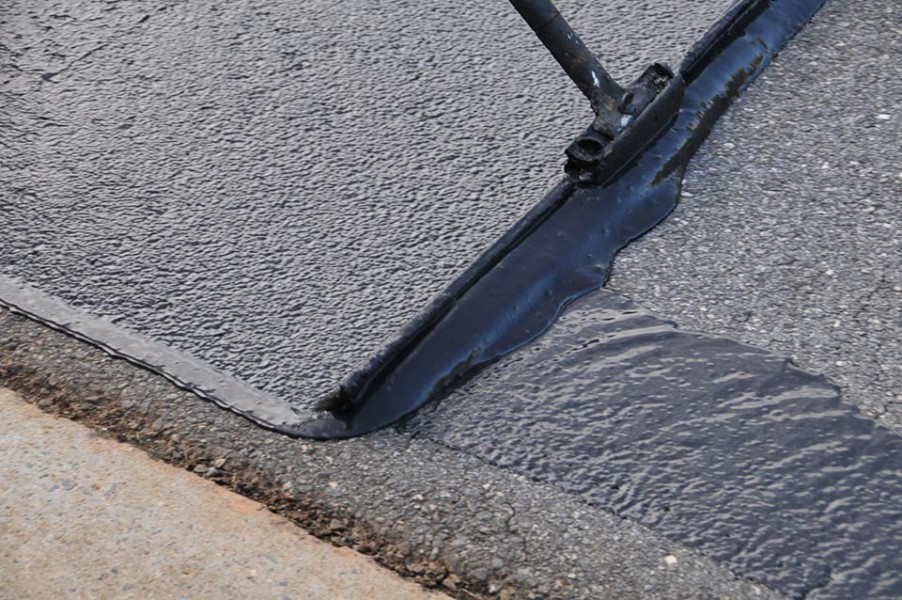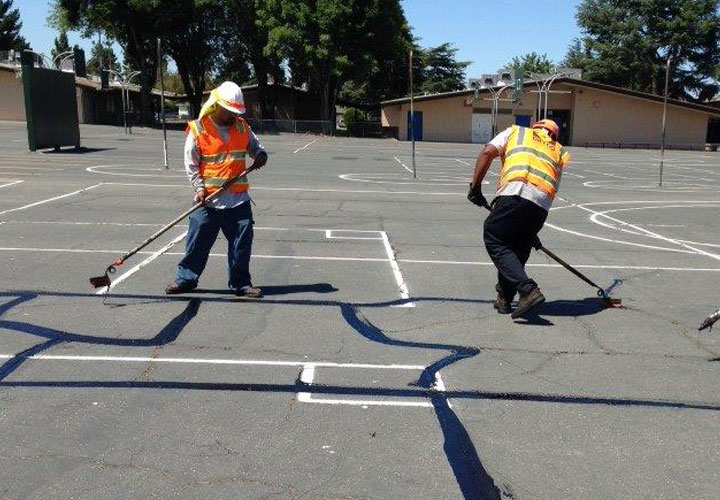Lengthen Pavement Life-span: Ingenious Cold Mix Asphalt Sealing
Lengthen Pavement Life-span: Ingenious Cold Mix Asphalt Sealing
Blog Article
Cold Mix Asphalt Vs. Hot Mix Asphalt: Which Is Right for You?

Composition Differences
Cold mix and warm mix asphalts vary considerably in their composition, with distinct features that influence their efficiency and applications. Cold mix asphalt is generated by emulsifying the asphalt binder with water and an emulsifying representative prior to mixing it with aggregate. This technique permits the asphalt to be practical at lower temperatures, making it perfect for temporary repair services and for usage in chillier weather. Warm mix asphalt, on the other hand, is produced at heats, typically in between 300-350 ° F, which assists to achieve better compaction and a more durable final item. The warm mix asphalt production process entails heating the accumulation and asphalt binder separately prior to integrating them at the asphalt plant.
Additionally, cold mix asphalt tends to be much less dense and more flexible than hot mix asphalt. This adaptability makes it far better fit for areas with higher levels of movement, such as driveways or roadways with hefty web traffic. On the other hand, hot mix asphalt is understood for its high resilience and resistance to rutting and cracking, making it a preferred choice for highways and high-traffic roads where durability is essential.
Installation Process Variations
The procedure of installing cool mix and warm mix asphalt exhibits significant variances in their requirements and procedures. Cold mix asphalt, being a much more versatile material, can be used directly from the bag or container onto the hole or damaged area. It calls for very little preparation job, such as cleaning up the area and compacting the chilly blend with hand tools. This makes it a hassle-free choice for fast and short-term fixes. On the other hand, hot mix asphalt necessitates a much more intricate installation process. It involves heating up the mixture to high temperature levels prior to laying it down on a correctly prepared base. The preparation consists of compacting the base, using a tack coat, and using heavy machinery like pavers and compactors for a durable and smooth finish. Due to the home heating needs, warm mix asphalt setups are usually performed by experts with specific equipment, guaranteeing a more irreversible and structurally sound result.
Durability and Longevity Elements
When taking into consideration asphalt alternatives, resilience and longevity are vital aspects this website to examine for lasting sidewalk efficiency. Warm mix asphalt (HMA) is recognized for its extraordinary sturdiness and durability. The high temperatures during the laying and blending procedure enable for better compaction, leading to a denser and more powerful sidewalk structure. This leads to HMA being more resistant to rush hour lots, rough climate conditions, and the effects old compared to cool mix asphalt (CMA)
In terms of longevity, HMA usually surpasses CMA because of its premium stamina and resistance residential or commercial properties. HMA pavements have a longer service life, requiring much less regular repairs and upkeep, which can equate to set you back financial savings over time. Additionally, HMA pavements are much more conveniently customizable to satisfy specific job needs, further boosting their durability.
Price Factors To Consider
Thinking about the monetary effects is an important element when evaluating the selection between warm mix asphalt (HMA) and cold mix asphalt (CMA) for sidewalk jobs. While the first expense of hot mix asphalt is usually higher than that of cool mix asphalt, HMA commonly supplies a more cost-effective solution in the long run due to its remarkable longevity and longevity.
In addition to product costs, it's vital to take into consideration the costs linked with installment and upkeep when comparing look at more info HMA and CMA. Ultimately, the decision between HMA and CMA need to take into account not simply the first cost but likewise the long-lasting monetary implications to identify the most economical choice for the details pavement project.
Environmental Effect Contrast
Contrast of the ecological effects in between warm mix asphalt (HMA) and chilly mix asphalt (CMA) exposes distinctive distinctions in sustainability techniques. HMA manufacturing requires high temperature levels, leading to boosted power intake and greenhouse gas discharges.
Furthermore, the usage of CMA usually involves recycling existing asphalt pavement, promoting source conservation and decreasing the quantity of waste sent to land fills. By opting for CMA over HMA, road building and construction projects can add positively to environmental conservation efforts.
Verdict
In conclusion, the option between chilly mix asphalt (CMA) and warm mix asphalt (HMA) depends upon different variables such as make-up, setup procedure, toughness, longevity, cost, and ecological effect. cold mix asphalt. While CMA provides a economical and fast remedy for small repairs, HMA ensures premium durability and longevity for rush hour locations. Take into consideration these elements meticulously to establish which sort of asphalt is the best choice for your paving needs

Taking into consideration the financial ramifications is an important aspect when examining the selection between warm mix asphalt (HMA) and chilly mix asphalt (CMA) for pavement jobs. While the first cost of hot mix asphalt is normally higher than that of cold mix asphalt, HMA frequently supplies a more cost-efficient service in the lengthy run due to its exceptional sturdiness and long life. asphalt patch repair.Comparison of the ecological impacts in between hot mix asphalt (HMA) and cool mix asphalt (CMA) exposes unique distinctions in sustainability find out here techniques.In final thought, the selection between cold mix asphalt (CMA) and warm mix asphalt (HMA) depends on numerous variables such as composition, installation procedure, resilience, longevity, cost, and environmental impact
Report this page